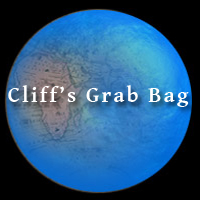|
-
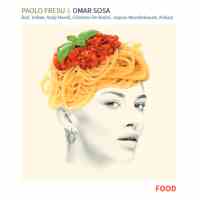
-
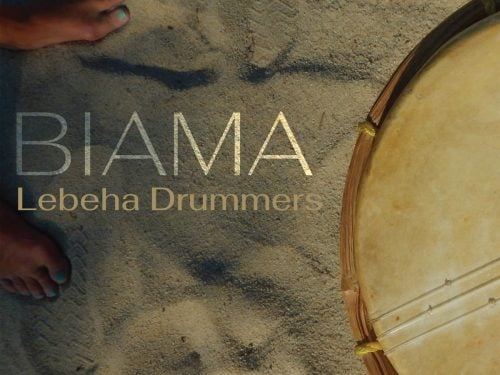 Lebeha Drummers formed in 2003 in Hopkins Village in Belize as an after-school program dedicated to nurturing and transmitting the music’s unique percussion, vocals, and dance styles to young Garifuna. Rooted in Garifuna spiritual practices, its energetic percussive character, dance movements, and vocals resonate with other West African and Amerindian genres brought together in a cultural efflorescence inadvertently sparked by the European colonial adventure in the erstwhile New World. Michael Stone, in his review in RootsWorld.
Lebeha Drummers formed in 2003 in Hopkins Village in Belize as an after-school program dedicated to nurturing and transmitting the music’s unique percussion, vocals, and dance styles to young Garifuna. Rooted in Garifuna spiritual practices, its energetic percussive character, dance movements, and vocals resonate with other West African and Amerindian genres brought together in a cultural efflorescence inadvertently sparked by the European colonial adventure in the erstwhile New World. Michael Stone, in his review in RootsWorld. -
 "With advanced degrees in musical performance and voice, and captured by the culture, spirituality and music of Candomblé, Bahia-born Irma Ferreira began a profound investigation of her Afro-Brazilian roots... (her) first solo album release, Ém Cantos de Orisá, bears the fruit of her investigation, borrowing both chants and melodies from Candomblé’s trove of devotional works. The chants have a more liturgical sound, while the songs suggest more secular themes. Pronounced percussion, typically expressive of the the more bellicose orisás, such as Sango, the spirit of thunder and lightning, and Ogúm, the warrior lord of iron and steel, yields to a more melody driven sound in Ferreira’s interpretations. The instrumentation, a blend of Western and Afro Brazilian, provides a felicitous, understated backdrop for her vocals." - RootsWorld
"With advanced degrees in musical performance and voice, and captured by the culture, spirituality and music of Candomblé, Bahia-born Irma Ferreira began a profound investigation of her Afro-Brazilian roots... (her) first solo album release, Ém Cantos de Orisá, bears the fruit of her investigation, borrowing both chants and melodies from Candomblé’s trove of devotional works. The chants have a more liturgical sound, while the songs suggest more secular themes. Pronounced percussion, typically expressive of the the more bellicose orisás, such as Sango, the spirit of thunder and lightning, and Ogúm, the warrior lord of iron and steel, yields to a more melody driven sound in Ferreira’s interpretations. The instrumentation, a blend of Western and Afro Brazilian, provides a felicitous, understated backdrop for her vocals." - RootsWorld -
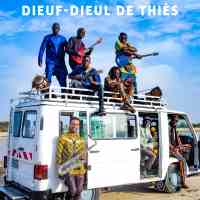 Mbalax rhythms underpin split-second horn blasts, hypnotic, stoned discharges of Seck’s fuzz-drenched lead guitar, and Sarr’s deep, soaring vocals on the long awaited return of Senegambian band Dieuf-Dieul De Thiès. Recorded on analog equipment brought to St. Louis, Senegal from France, with the rhythm section recorded live while vocals and horns were tracked in separate booths, the music percolates, complimenting their earlier work without feeling forced or antiquated. Bruce Miller, in his review in RootsWorld.
Mbalax rhythms underpin split-second horn blasts, hypnotic, stoned discharges of Seck’s fuzz-drenched lead guitar, and Sarr’s deep, soaring vocals on the long awaited return of Senegambian band Dieuf-Dieul De Thiès. Recorded on analog equipment brought to St. Louis, Senegal from France, with the rhythm section recorded live while vocals and horns were tracked in separate booths, the music percolates, complimenting their earlier work without feeling forced or antiquated. Bruce Miller, in his review in RootsWorld. -

Salvant’s ability to sing in multiple languages is, in part, due to her being the child of a French mother and Haitian father. She began classical piano studies at 5, sang in a children’s choir at 8, and started classical voice lessons as a teenager. She emerged with a vocal range and talent that one might expect from a performer with significantly more life experience. Yet this old soul, who generally surrounds herself with performers in their 30s, brings a layered depth to her music that comes from historical research and an ability to unearth forgotten songs and make them her own. The story of Mélusine has a common theme of imagining women as witches, mermaids and other transformative creatures from Greek mythology. It conjures a European folklore legend sung in French, Occitan and Haitian Creole, with her own compositions, and selections dating from the 12th Century. She uses these songs and stories in part to convey a character she often plays in her work - an intelligent coquette who is more interested in playing with men’s affection than seeking it out. - Lisa Sahulka -
 If you’ve heard any maloya music from the Indian Ocean island of Réunion, the chances are it brings to mind a characteristic rhythm played on percussion, and probably an image of today’s best-known maloya musician internationally, Danyel Waro, energetically shaking his rectangular flat kayamb shaker. Ann O’aro’s third recording isn’t at all like that, even though she’s toured with Waro, and his son Bino is the percussionist in her band, along with trombone player Teddy Doris and electronic manipulations by Brice Nauroy. Bleu is an album far from the usual, far from what’s generally thought of as maloya, and indeed music that wouldn’t immediately be identified as from Réunion. For both Ann O’aro and the music of Réunion, it’s quite a step, and an interesting one. Read Andrew Cronshaw's review and listen to some of the music.
If you’ve heard any maloya music from the Indian Ocean island of Réunion, the chances are it brings to mind a characteristic rhythm played on percussion, and probably an image of today’s best-known maloya musician internationally, Danyel Waro, energetically shaking his rectangular flat kayamb shaker. Ann O’aro’s third recording isn’t at all like that, even though she’s toured with Waro, and his son Bino is the percussionist in her band, along with trombone player Teddy Doris and electronic manipulations by Brice Nauroy. Bleu is an album far from the usual, far from what’s generally thought of as maloya, and indeed music that wouldn’t immediately be identified as from Réunion. For both Ann O’aro and the music of Réunion, it’s quite a step, and an interesting one. Read Andrew Cronshaw's review and listen to some of the music. -
 It's a year and a half since Simon Emmerson, the founder and guiding light of Afro Celt Sound System, died. But the band lives on, playing a fresh set of dates to coincide with the release of OVA, Emmerson's swansong with the group. It's a beautiful piece of work, and from the opening notes of "The Hawk Owl's Lament," which swoops and glides, rises and dives like the bird, everything is pitched just right. It's a reminder of just what he achieved with Afro Celt Sound System, as well as all his other projects. He was the imagination behind them all, and the glue that held them together. Chris Nickson, in his review in RootsWorld.
It's a year and a half since Simon Emmerson, the founder and guiding light of Afro Celt Sound System, died. But the band lives on, playing a fresh set of dates to coincide with the release of OVA, Emmerson's swansong with the group. It's a beautiful piece of work, and from the opening notes of "The Hawk Owl's Lament," which swoops and glides, rises and dives like the bird, everything is pitched just right. It's a reminder of just what he achieved with Afro Celt Sound System, as well as all his other projects. He was the imagination behind them all, and the glue that held them together. Chris Nickson, in his review in RootsWorld. -
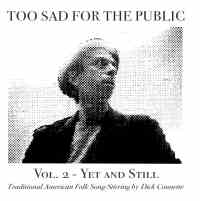 In his lovely, soulful second album as the collaborative Too Sad for the Public, composer Dick Connette reverently and sometimes irreverently takes the roughhewn spirit of American folk music and refines it like a hunk of whale bone etched into an elaborate, beautiful scrimshaw. Over the years, Connette has irregularly skimmed across the music-industry firmament like a comet, as a producer of others and then with his ensemble Last Forever, where he carefully designed his exquisitely wrought chamber-folk songs and assembled talented musicians to perform them.... On his latest, Too Sad for the Public: Vol. 2: Yet and Still, Connette mostly turns to Canadian-born and Brooklyn-based Ana Egge as the vocal focus of the songs with lyrics. Her bluesy drawl – reminiscent of the laidback, late-night, jazz-hipster singing of Rickie Lee Jones - gives the songs a sardonic, wry sensibility. On “G. Burns in the Bottom,” which takes off from an old string-band song, Egge sings with the darkest of humor: “It’s the awful truth in a world of hurt; Nobody’s smarter than the dirt.” Though known as a musical composer, Connette also shines as a lyricist. His sung stories have the resonance of folk wisdom, but he seasons his wisdom with wry touches of absurdist wit. “I can tell time but I can’t tell it much,” says one narrator. Connette is able to evoke the struggles of his hapless townspeople while still leavening it with a deadpan sense of humor. - Marty Lipp in RootsWorld Magazine
In his lovely, soulful second album as the collaborative Too Sad for the Public, composer Dick Connette reverently and sometimes irreverently takes the roughhewn spirit of American folk music and refines it like a hunk of whale bone etched into an elaborate, beautiful scrimshaw. Over the years, Connette has irregularly skimmed across the music-industry firmament like a comet, as a producer of others and then with his ensemble Last Forever, where he carefully designed his exquisitely wrought chamber-folk songs and assembled talented musicians to perform them.... On his latest, Too Sad for the Public: Vol. 2: Yet and Still, Connette mostly turns to Canadian-born and Brooklyn-based Ana Egge as the vocal focus of the songs with lyrics. Her bluesy drawl – reminiscent of the laidback, late-night, jazz-hipster singing of Rickie Lee Jones - gives the songs a sardonic, wry sensibility. On “G. Burns in the Bottom,” which takes off from an old string-band song, Egge sings with the darkest of humor: “It’s the awful truth in a world of hurt; Nobody’s smarter than the dirt.” Though known as a musical composer, Connette also shines as a lyricist. His sung stories have the resonance of folk wisdom, but he seasons his wisdom with wry touches of absurdist wit. “I can tell time but I can’t tell it much,” says one narrator. Connette is able to evoke the struggles of his hapless townspeople while still leavening it with a deadpan sense of humor. - Marty Lipp in RootsWorld Magazine -
 Polobi and the Gwo Ka Masters’ Abri Cyclonique is largely the production work of Irish-Parisian producer Doctor L – aka Liam Farrell. This record doesn’t sound anything like traditional Gwoka drumming and singing, which is what 69 year old Creole singer and drummer Moise Polobi, from Petit-Bourg, Guadeloupe, became obsessed with as a boy. Eventually, he became a master of toumblak, a prominent Gwoka rhythm; he also joined drum, vocal, and dance troupe Indestwas Ka, who have recorded multiple albums and toured France and Canada. Musically, Gwoka demonstrates one more infectious, celebratory example of African musical tradition in the Caribbean.
Polobi and the Gwo Ka Masters’ Abri Cyclonique is largely the production work of Irish-Parisian producer Doctor L – aka Liam Farrell. This record doesn’t sound anything like traditional Gwoka drumming and singing, which is what 69 year old Creole singer and drummer Moise Polobi, from Petit-Bourg, Guadeloupe, became obsessed with as a boy. Eventually, he became a master of toumblak, a prominent Gwoka rhythm; he also joined drum, vocal, and dance troupe Indestwas Ka, who have recorded multiple albums and toured France and Canada. Musically, Gwoka demonstrates one more infectious, celebratory example of African musical tradition in the Caribbean. -
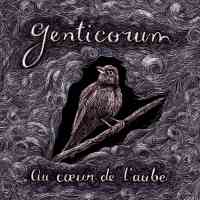 After more than two decades together, the three members of Genticorum form one of the tightest units on the planet. In music from their native Québec (both traditional and original) they have found a rich seam that clearly has plenty of treasures to mine.... It crackles with gleeful energy. The interplay between the instruments and harmonies is sharp and adept, yet still a completely natural, high-octane conversation that constantly shifts from one player to another. Read a review and listen to the music.
After more than two decades together, the three members of Genticorum form one of the tightest units on the planet. In music from their native Québec (both traditional and original) they have found a rich seam that clearly has plenty of treasures to mine.... It crackles with gleeful energy. The interplay between the instruments and harmonies is sharp and adept, yet still a completely natural, high-octane conversation that constantly shifts from one player to another. Read a review and listen to the music.


